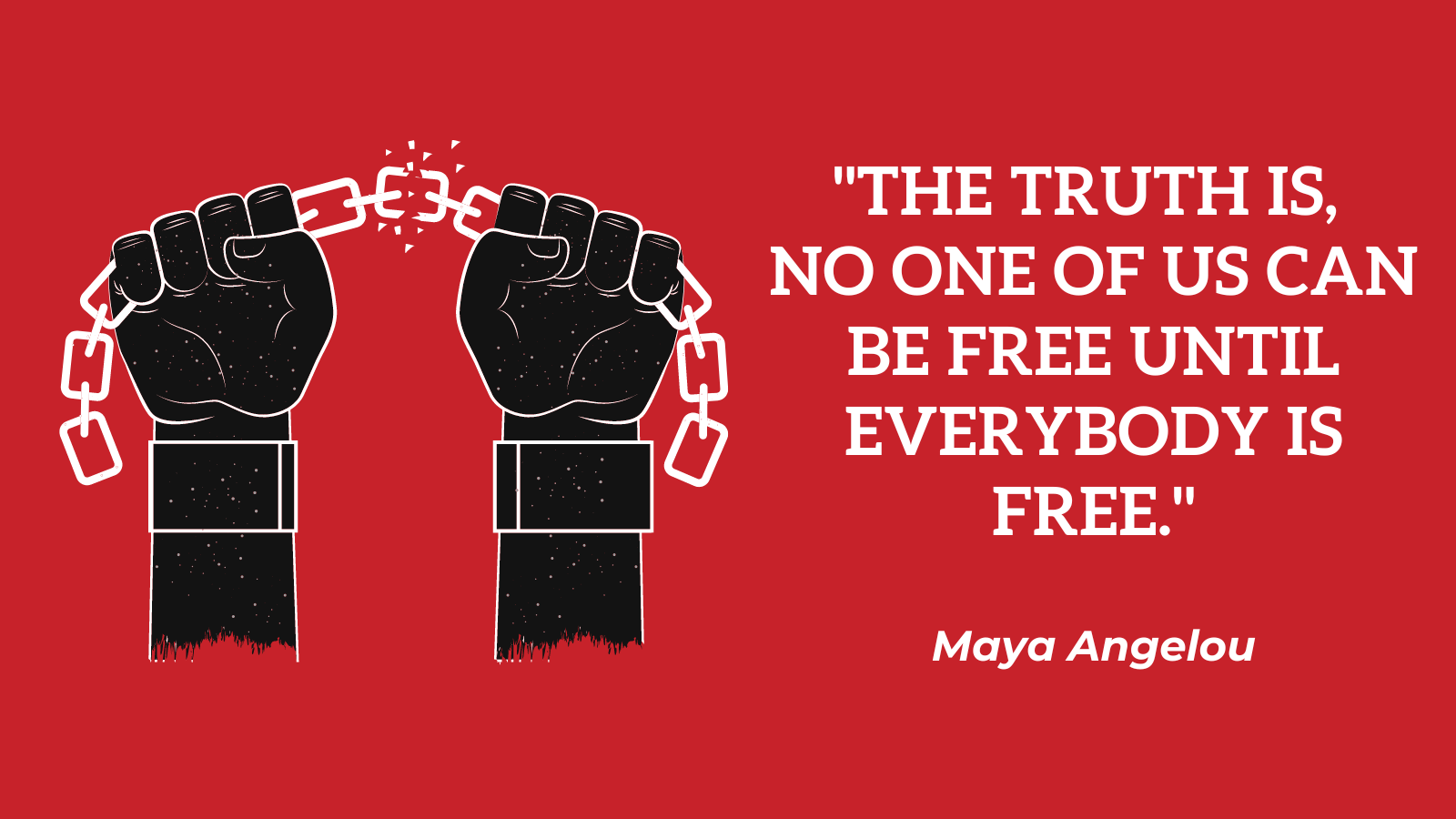Making Juneteenth Memorable and Meaningful In Schools

On June 19, 2021, Juneteenth was officially recognized by the United States as a federal holiday. The acknowledgment and observance is significant, especially for Black Americans who have been celebrating the holiday for more than 150 years.
Observing Juneteenth is important because the holiday represents the date Black Americans officially became emancipated. Many people associate the end of slavery with the Emancipation Proclamation, which was issued by President Abraham Lincoln in 1863 - but that is not entirely factual.
The truth is more complicated. President Lincoln only applied the Emancipation Proclamation to Confederate states that were actively rebelling. Three Union-occupied Confederate states and four border slave states were exempt from the proclamation, meaning slavery was still very much active after the proclamation went into effect.
Laura Smalley experienced that exemption firsthand, and in a 1941 interview, she shared how slave owners were able to avoid the Emancipation Proclamation.
“Old master didn’t tell, you know, they was free,” Smalley said. “I think now they say they worked them, six months after that. Six months. And turn them loose on the 19th of June. That’s why, you know, we celebrate that day.”
On June 19, 1865 - two years after the Emancipation Proclamation and two months after Confederate General Robert E. Lee surrendered - all Black Americans were officially free. More than 2,000 Union troops rode into Galveston, Texas to announce the war’s end and that all individuals used for slavery had been freed from their chains. The announcement affected the lives of 250,000 people that were enslaved at the time.
Having Juneteenth declared a national holiday means there is a great opportunity for educators to help students from all backgrounds honor and celebrate the abolition of slavery in the United States. Below, we’ve rounded up some examples of how to bring Juneteenth into your school.
Ways you can make Juneteenth memorable and meaningful in schools
Organize a Juneteenth assembly
Get the whole school involved by hosting a Juneteenth assembly. Keep students engaged by bringing in guest speakers to share stories and performers to highlight culture. Utilize multimedia like slideshows and videos to explain why Juneteenth is a special day and give students tips on how to carry the Juneteenth spirit forward.
Share clips
The internet has made it easy to find and share clips. From funny to informational, video clips are a great way to break up a lesson with some quick information. Below are some entertaining and educational clips that are between two and five minutes long.
- black-ish’s Juneteenth episode
- The series that highlighted Black identity and culture aired a Juneteenth episode in October, 2017. In the episode, the Johnson family attends a play that is a historical misrepresentation of Columbus Day. Upset by the play’s inaccuracies, Johnson patriarch Dre takes it upon himself to create a song that raises awareness around Juneteenth.
- Why Juneteenth is Important for America
- In 2018, The Root released this video about the importance of Juneteenth. It highlights the violent backlash newly freed Black Americans experienced from white Americans and how those Black Americans rose up through celebrating on June 19.
- Juneteenth Explained
- This animated clip is best for younger audiences. It presents information clearly and concisely and, at two minutes and four seconds, is short enough for those with short attention spans.
- Meet the Grandmother of Juneteenth
- Opal Lee is famously known as the “Grandmother of Juneteenth” for her decades-long fight to make Juneteenth a national holiday. At 94 years old, Opal’s fight came to an end when President Joe Biden made Juneteenth a federal holiday.
- The celebration of the first federally observed Juneteenth
- See how people celebrated Juneteenth’s first year as a nationally recognized holiday.
Watch an informational film
If you want to move away from video clips and get into more substantial digital content, feature-length documentaries or historical films are a great way to communicate information to students. Below is a mix of documentary and historical films to show in the classroom.
- 13th
- The Color Purple
- Fruitvale Station
- Hidden Figures
- High On the Hog
- I Am Not Your Negro
- It’s a Wonderful Plight
- Juneteenth: A Celebration of Overcoming
- Miss Juneteenth
- The Rise and Fall of Jim Crow
Visit a museum
Museums are a great way for students to absorb history, with engaging displays and fascinating facts. New Jersey has two museums dedicated to Black history that are worth a field trip.
Host creative-exploration projects
For many learners, creativity can open up new pathways. Through art, dance, music and more, humans can express themselves more than just verbally. Colors, movements and visualizations are open to interpretation and through these mediums, the creator can communicate their thoughts and feelings in diverse ways.
Here are a few ways students can creatively honor Juneteenth:
- Holding a poster contest
- Listening traditional African American work songs
- Writing a poem
- Using multimedia art to tell the Juneteenth story
- Learning traditional African dances and the meaning behind them
- Arrange a Juneteenth display in the classroom or school lobby that students can collaborate on
Honor those who champion the spirit of Juneteenth
Are there educators, stakeholders or students that honor the spirit of Juneteenth all year? Highlight their contributions! There are many ways to do so - social media posts, a website or newsletter feature, a school display, guest speaker opportunities… and the list goes on.
Visit a historical site
New Jersey is home to multiple historic sites that honor Black Americans’ history and success. Below are a few locations where students can see where history took place and learn why these sites are so significant.
- Krueger-Scott Mansion
- This property was purchased by Madame Louise Scott, Newark's first African-American female millionaire, in 1958. Scott founded the Scott School of Beauty Culture
- The Martin Luther King House
- Visit the site where Dr. Martin Luther King Jr. planned his first anti-discrimination lawsuit.
- Mount Zion AME Church
- The church is a former Underground Railroad stop, with a trap door located under the church vestibule.
- Thomas Mundy Peterson's grave
- Thomas Mundy Peterson is the first Black American voter. He was born in Metuchen, New Jersey and was laid to rest at St. Peter's Episcopal Church in Perth Amboy, New Jersey.
Highlight community events
Upcoming community events in New Jersey include:
3rd Annual Juneteenth Celebration Event
Glassboro Sports Complex
June 18
Celebrate community and unity with activities like music, an obstacle course, dancing, poetry and more. Attendees will also have a chance to check out the event’s vendors, which feature Black-owned businesses.
Juneteenth Celebration
Martin Luther King Jr. Center, Newtonville
June 19
The African American Heritage Museum of Southern New Jersey (AAHMSNJ) and the Martin Luther King, Jr. Center have collaborated on an insightful and informational event. The program will be moderated by local storyteller Michelle Washington and will feature a short film, Juneteenth 1856-2021, as well as giveaways.
New Jersey State Library Juneteenth Hack-A-Thon
June 15
Virtual
Freedom on the Move is an online project spearheaded by Cornell University and devoted to fugitives from slavery in North America. This Hack-A-Thon is a crowd-sourcing way to help them create a database for tens of thousands of advertisements placed by enslavers who wanted to recapture self-liberating Africans and African-Americans.
Black Excellence Festival
Showboat Hotel, Atlantic City
June 17-19
This three-day festival features speakers, comedians, music and a film festival - all celebrating the Black experience.
Juneteenth Celebration
June 19
American Dream Outdoor Event Space, Rutherford
Spend the day dancing to one of the many musical acts on this celebration’s roster. Festival attendees can also indulge in cultural food and drinks, participate in activities and explore interactive spaces.
Antiracist Educators Summer Series
Virtual
June 21, 28; July 12, 19, 26
$90-$99
The series features seven 75-minute workshops and conversations on a transformative approach to antiracism in education, meeting Tuesday nights in June and July.
Turn on a podcast during quiet time
As the world becomes increasingly digital, there are many diverse ways to present information to students. Podcasts have taken our culture by storm and there are many shows and episodes that touch on Juneteenth and the Black experience overall. The next time your class has quiet time, consider turning on one of these podcasts:
- Hey Black Child
- AFROSAYA The Afrolatino Podcast
- The Peas in the Podcast: Merry Juneteenth!
- The Takeaway: 153 Years of Juneteenth
- One Mic | Black History
Assign reflective essays
Allow students some time alone with their thoughts on Juneteenth. Writing can help individuals sort out their thoughts, communicate concepts they are self conscious saying aloud and provide a therapeutic outlet. Allow students some time to write freely about Juneteenth.
A few writing prompts include:
What does Juneteenth mean to you?
Why do you think Juneteenth was not a federal holiday?
How do you plan to celebrate and acknowledge Juneteenth year round?
Do you look at Independence Day differently after learning about Juneteenth? Explain.
Collect resources to enjoy year round
For many Americans, Juneteenth isn’t just a holiday or even one day. Juneteenth represents freedom, joy, celebration, community, culture and much more. It is important that this spirit is honored year round, and classroom resources can help that spirit thrive. A great place to start is the online marketplace, Teachers Pay Teachers, which has Juneteenth resources for all grades and subjects. By purchasing materials through Teachers Pay Teachers, you are giving your money to a fellow educator.
Start a book club
Start an in-classroom book club, where students dive into topics that spark discussion. By choosing book titles related to Juneteenth, emancipation, civil rights, Black history and other topics that center the Black experience, students will have a better understanding of what it means to be Black in America.
Books suited for young audiences include:
- Up from the Ashes
- Juneteenth for Mazie
- Freedom’s Gifts: A Juneteenth Story
- The History of Juneteenth: A History Book for New Readers
- Opal Lee and What It Means to Be Free: The True Story of the Grandmother of Juneteenth
Books suited for adolescent and young adult audiences (13-18) include:
- If These Stones Could Talk: African American Presence in the Hopewell Valley, Sourland Mountain and Surrounding Regions of New Jersey
- Tulsa’s Historic Greenwood District
- Teaching Community: A Pedagogy of Hope
- How to Be an Antiracist
- Juneteenth
Invite a speaker
New Jersey is full of rich history that highlights the accomplishments of Black Americans. Celebrate these achievements by inviting community members to speak to your school or classroom. The best part of inviting community leaders to the classroom is introducing students to role models right where they live.
If you’re considering following your dream of teaching, Rutgers Alternate Route can offer you the support and training you need to succeed. Be sure to follow Rutgers Alternate Route on Twitter and sign up for Alternate Route’s monthly newsletter for more information and stories from the field of education.

 Lindsay Patton is a digital communications professional who specializes in social media, writing, digital marketing, e-commerce, podcasting and other content-focused endeavors. Since 2019, she has assisted Alternate Route with its marketing strategy to help the program reach new audiences. As a result of this collaboration, Alternate Route has introduced Lindsay to many of New Jersey's talented educators, who have had a direct influence on her own classroom strategies as an adjunct professor. She is grateful for the opportunity to create meaningful content that helps increase equity within classrooms and is inspired by Alternate Route's hardworking team.
Lindsay Patton is a digital communications professional who specializes in social media, writing, digital marketing, e-commerce, podcasting and other content-focused endeavors. Since 2019, she has assisted Alternate Route with its marketing strategy to help the program reach new audiences. As a result of this collaboration, Alternate Route has introduced Lindsay to many of New Jersey's talented educators, who have had a direct influence on her own classroom strategies as an adjunct professor. She is grateful for the opportunity to create meaningful content that helps increase equity within classrooms and is inspired by Alternate Route's hardworking team. 





